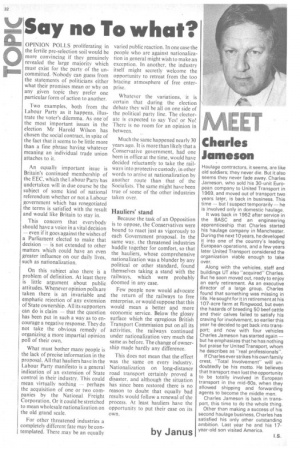Say no To what?
Page 34

If you've noticed an error in this article please click here to report it so we can fix it.
OPINION POLLS proliferating in the fertile pre-selection soil would be more convincing if they genuinely revealed the large majority which must exist for the party of the uncommitted. -Nobody can guess from the statements of politicians either what their promises mean or why on any given topic they prefer one particular form of action to another.
Two examples, both from the Labour Party as it happens, illustrate the voter's dilemma. As one of the most important issues in the election Mr Harold Wilson has chosen the social contract, in spite of the fact that it seems to be little more than a fine phrase having whatever meaning an individual trade union attaches to it.
An equally important issue is Britain's continued membership of the EEC, which the Labour Party has undertaken will in due course be the subject of some kind of national referendum whether or not a Labour government which has renegotiated the terms is satisfied with the result and would like Britain to stay in.
This concern that everybody should have a voice in a vital decision — even if it goes against the wishes of a Parliament elected to make that decision --is not extended to other matters which could have an even greater influence on our daily lives, such as nationalization.
On this subject also there is a problem of definition. At least there is little argument about public attitudes. Whenever opinion polls are taken there is an invariable and emphatic rejection of any extension of State ownership. All its supporters can do is claim — that the question has been put in such a way as to encourage a negative response. They do not take the obvious remedy of organizing a more impartial opinion poll of their own.
What must bother many people is the lack of precise information in the proposal. All that hauliers have in the Labour Party manifesto is a general indication of an extension of State control in their industry. This could mean virtually nothing — perhaps the acquisition of one or two companies by the National Freight Corporation. Or it could be stretched to mean wholesale nationalization on the old grand scale.
For other threatened industries a completely different fate may be contemplated. There may be an equally varied public reaction. In one case the people who are against nationalization in general might wish to make an exception. In another, the industry itself might secretly welcome the opportunity to retreat from the too bracing atmosphere of free enterprise.
Whatever the variations, it is certain that during the election debate they will be all on one side of the political party line. The electorate is expected to say Yes! or No! There is no room for an opinion in between.
Much the same happened nearly 30 years ago. It is more than likely that a Conservative government, had one been in office at the time, would have decided reluctantly to take the railways into protective custody, in other words to arrive at nationalization by another route than that of the Socialists. The same might have been true of some of the other industries taken over.
Hauliers' stand
Because the task of an Opposition is to oppose, the Conservatives were bound to react just as vigorously to each Government proposal. In the same way, the threatened industries huddle together for comfort, so that the hauliers, whose comprehensive nationalization was a blunder by any political or other standard, found themselves taking a stand with the railways, which were probably doomed in any case.
Few people now would advocate the return of the railways to free enterprise, or would suppose that this would mean a better and more economic service. Below the glossy surface which the egregious British Transport Commission put on all its activities, the railways continued under nationalization very much the same as before. The change of ownership made hardly any difference.
This does not mean that the effect was the same on every industry. Nationalization on long-distance road transport certainly proved a disaster, and although the situation has since been restored there is no reason to doubt that equally bad results would follow a renewal of the process. At least hauliers have the opportunity to put their case on its own.
by Janus












































































































